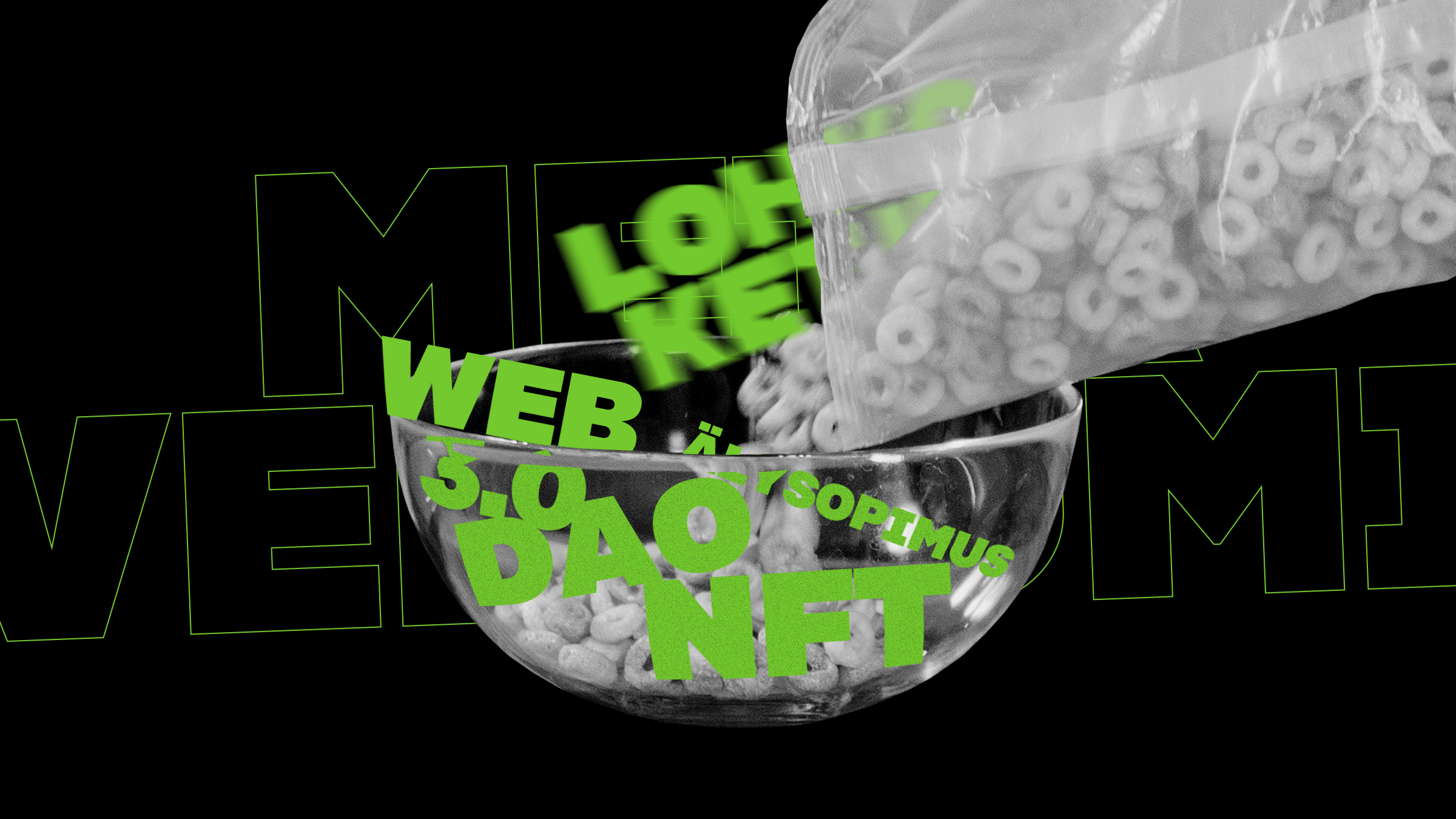Language, technology and culture are evolving side by side. Technology-related topics in particular give rise to new terminology – often in English first. It is also important to be able to talk about a topic in one’s own language using common definitions.
We have compiled a set of terms related to the new stage of development of the internet that we think need to be explained. The list is not intended to be academically rigorous or exhaustive, but we hope that it will help with understanding the concepts.
As part of the data economy Data economy An area of the economy where the collection and use of data are a key part of activities. Open term page Data economy transformation, the internet is entering its third phase of development, Web 3.0. Web 3.0 A development phase of the internet, which aims to provide services that enable decentralised decision-making and commerce. Open term page Web 3.0 This topic has already given rise to a number of concepts that can be interpreted in different ways. The definitions below are our own. All terms defined in Sitra projects are available in our Dictionary in Finnish, Swedish and English.
We will update and supplement the dictionary as necessary. Let us know if you think there are other terms that need explaining.
web 3.0; web3 Web 3.0 A development phase of the internet, which aims to provide services that enable decentralised decision-making and commerce. Open term page Web 3.0
A development phase of the internet, which aims to provide services that enable decentralised decision-making and commerce.
Decentralised decision-making can use Decentralised Autonomous Organisations Decentralised Autonomous Organisation; DAO An organisation that operates independently or autonomously, without the management structure of a normal organisation, using blockchain technology. Open term page Decentralised Autonomous Organisation; DAO and trading can use cryptocurrencies or non-fungible tokens, Non-fungible token; NFT A certificate of the right to a digital copy whose current owner and possession history have been verified using blockchain technology. Open term page Non-fungible token; NFT for example, typically authenticated by blockchains. Blockchain A continuously accumulating decentralised data entity in which all transactions are chronological, validated by all parties and stored in a way that cannot be altered or falsified. Open term page Blockchain Web 1.0 refers to the early days of the internet, when web pages were read-only, while Web 2.0 to the current development phase of the internet, where interactive web services are mainstream.
metaverse Metaverse An internet-based entity consisting of persistent virtual spaces, where interaction is possible within and between virtual spaces. Open term page Metaverse
An internet-based entity consisting of persistent virtual spaces, where interaction is possible within and between virtual spaces.
The metaverse brings a sense of space and characters to the internet, creating a network that connects virtual worlds. The metaverse can be used for communication, creating events and gatherings, for example.
smart contract Smart contract A programme implemented using blockchain technology that enables the automatic exchange of items of value under pre-defined rules. Open term page Smart contract
A programme implemented using blockchain technology that enables the automatic exchange of items of value under pre-defined rules.
The operating logic and results of a smart contract are public. A smart contract removes intermediaries from the process and makes it reliable. Smart contracts are used in numerous different areas, such as decentralised finance.
Decentralised Autonomous Organisation (DAO) Decentralised Autonomous Organisation; DAO An organisation that operates independently or autonomously, without the management structure of a normal organisation, using blockchain technology. Open term page Decentralised Autonomous Organisation; DAO
An organisation that operates independently or autonomously, without the management structure of a normal organisation, using blockchain technology. The members direct operations directly with smart contracts and tokens in their possession. Decentralised Autonomous Organisations can be considered as the co-operatives of the digital age.
The operational and decision-making rules of a Decentralised Autonomous Organisation are stored as smart contracts, which are based on blockchain technology. The same technology is also used for storing the decisions of the organisation. The organisation operates according to rules that it defines itself. For example, every member of the organisation can propose decisions that are voted on. Decentralised Autonomous Organisations can be used for investing and collecting art, among other things. In Finland, the need for legislative changes is currently being assessed, for example whether Decentralised Autonomous Organisations should be classified as legal persons.
Non-fungible token (NFT) Non-fungible token; NFT A certificate of the right to a digital copy whose current owner and possession history have been verified using blockchain technology. Open term page Non-fungible token; NFT
A certificate of the right to a digital copy whose current owner and possession history have been verified using blockchain technology.
Reference to the ownership of an item is usually by web link. The owned item may be a digital work, property, art object, building, degree or a company’s share. The rights enjoyed by the owner depend on the contract between the seller and buyer of the NFT, which can include intellectual property rights, such as copyright, property right or right of possession. Some NFTs sold through centralised intermediary services do not contain any legally recognised rights, as their legal status remains unclear.
Blockchain Blockchain A continuously accumulating decentralised data entity in which all transactions are chronological, validated by all parties and stored in a way that cannot be altered or falsified. Open term page Blockchain
A continuously accumulating decentralised data entity in which all transactions are chronological, validated by all parties and stored in a way that cannot be altered or falsified.
A blockchain generates a digital log of transactions. The log records are copied and stored in a decentralised way in public digital networks without a dominant server. Ethereum (2014) is the largest and best known blockchain. A blockchain can be used to create a variety of web 3.0 applications, services and products. It is practically impossible to alter or tamper with the transactions recorded in the blockchain afterwards, because each block in the blockchain contains the hashtag of the preceding block.
More terms and definitions can be found in Sitra’s Dictionary.
Data collective Data collective A collective aiming to make it easier for individuals to manage data. Open term page Data collective
A collective aiming to make it easier for individuals to manage data.
Data economy Data economy An area of the economy where the collection and use of data are a key part of activities. Open term page Data economy
An area of the economy where the collection and use of data are a key part of activities.
Decentralised finance; DeFI Decentralised finance; DeFI A financial service using blockchain technology and tokens that operates independently with smart contracts without intermediaries. Open term page Decentralised finance; DeFI
A financial service using blockchain technology and tokens that operates independently with smart contracts without intermediaries.
Digital wallet Digital wallet An application that enables trading and transactions via a digital device or online service. Open term page Digital wallet
An application that enables trading and transactions via a digital device or online service.
Token Token A token that describes the thing exchanged between parties in a blockchain. Open term page Token
A token that describes the thing exchanged between parties in a blockchain.
Consensus algorithm Consensus algorithm An algorithm that allows the computers of users in a network of computers to reach a consensus on what data is incorrect and what is correct. Open term page Consensus algorithm
An algorithm that allows the computers of users in a network of computers to reach a consensus on what data is incorrect and what is correct.
Proof-of-stake Proof-of-stake A consensus algorithm that validates a transaction with crypto tokens attached to a blockchain. Open term page Proof-of-stake
A consensus algorithm that validates a transaction with crypto tokens attached to a blockchain.
Proof of work Proof of work A consensus algorithm that validates a transaction through mechanical calculation. Open term page Proof of work
A consensus algorithm that validates a transaction through mechanical calculation.



